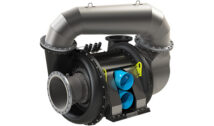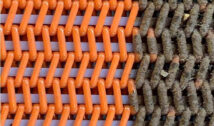
February 1st 2019, Fleur Rol defended her doctoral thesis of the University Grenoble Alpes, prepared under the supervision of Julien Bras, Associate Professor HDR (Grenoble INP-Pagora/LGP2). She presented the results of her research work entitled Cellulose pretreatments for a nanofibrillation by twin-screw extrusion.
The CERISE project, conducted under the auspices of the Tec21 Laboratory of Excellence and the Carnot PolyNat Institute, aims to develop a new process for manufacturing cellulose nanofibrils (CNF) with a high dry matter content and low energy consumption. Twin screw extrusion (TSE) – industrially well-known energy-efficient and highly adaptable technique – was optimized to produce CNF at 20 % dry content. By decreasing considerably their water content, this new strategy improves their transport cost, their storage and extends their field of application.
The objectives were to
- Develop new pretreatments of cellulose fibers to facilitate the nanofibrillation and produce high quality functionalized CNF.
- Optimize TSE screw profile and conditions to produce CNF.
- Prepare new materials made of this new type of CNF.
Four chemical pretreatments, identified as easily industrializable, have been optimized. Extrusion nanofibrillation was simulated by software to obtain optimal extrusion conditions. This cost-effective approach was validated at semi-industrial scale. Various applications are considered for these new NFC with a high dry matter content.
RELATED NEWS
AFT Varkaus – Celebrating 80 Years of Innovation
July 3, 2025
Paper Academy is launching this Tuesday, July 1st !
June 30, 2025
GRAVION is a TOP 100 Innovator 2025!
June 30, 2025
BHS Corrugated – New Cassette Facer CF-A
June 25, 2025
ZELLCHEMING-Expo 2025 set to open next week in Wiesbaden
June 24, 2025
Lecta publishes its 2024 Sustainability Report
June 20, 2025

































